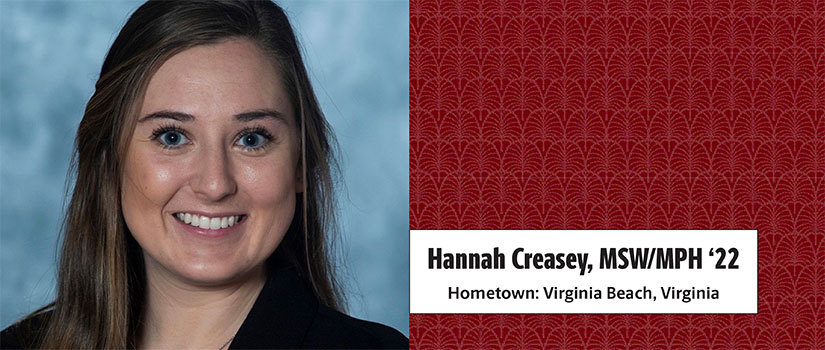An undergraduate student may not initially realize the social work connections in a variety of jobs and fields. There can be social work aspects, even if a job description does not have terms such as “child welfare” or “intervention.” It was not until near the end of her undergraduate studies that Master of Social Work combination degree student Hannah Creasey learned how she could apply social work to her future career.
Creasey majored in criminology at Lynchburg College in Virginia and was interested in the child welfare side of the field, which included working with victims of abuse. But as she prepared to graduate in 2019, conversations with some of her professors helped Creasey understand the connection between criminology and social work.
“I talked with them about their criminology field work and realized I wanted to do more on the social work side,” Creasey says. “While you can have a role in child welfare while working in criminology, social work gives you a different skill set to excel in working with that demographic.”
Creasey believed that social work was the best fit for her and how she wanted to tailor her career. Once she began at the College of Social Work last year, she knew it was the right place.
“There would be conversations in some classes when we talked about how a criminology background helps, even from just a statistics standpoint and knowing how many children experience abuse,” Creasey says. “I also took a theory class last year which was geared toward child and family dynamics and noticed some connections with criminology.”
There were also past experiences that influenced her educational path. Creasey, who also majored in Spanish at Lynchburg College, participated in two study abroad programs in 2018 to Chile and Costa Rica that made significant impacts.
“I was teaching English as a Second Language and working on service-learning projects in both countries,” Creasey says. “All the kids came from a low socio-economic status and bonding with the students and teachers, learning their culture, and being able to interact with them in Spanish were eye-opening experiences. It solidified to me that I wanted to work with children.”
Creasey also grew up around people in her life, including family members, who struggled with addiction. Living around individuals suffering the devastating impacts of addiction led her to learn more about addiction, how it affects others, and how she could help.
“In child welfare, I will come across adults and maybe children who are struggling with addiction,” Creasey says. “I want to take my personal experience and transfer to it to a professional setting so I can help others overcome their struggles or prevent addictions.”
Creasey’s interest in child welfare is an area of social work that is often misunderstood. Some may only have negative connotation, but according to Creasey, the goal is to give children the best opportunity to live a successful life.
“People in child welfare are there to help, and it's never the goal to take a child out of their home,” Creasey says. “Child welfare workers will do family interventions and work with the parents or caregivers to prevent taking a child out of their home, which is always a last resort.”
Creasey considers herself an overachiever, so the opportunity to attend graduate school and receive a combination degree in social work and public health intrigued her. She admits that the combination degree program is challenging because she is constantly meeting new people and her graduating social work and public health cohorts will be different than the ones when she started. But bringing different viewpoints to each of her classes is most rewarding, and Creasey believes this will be important once she embarks on a child welfare career.
“The nutrition and health behaviors side of public health may not seem relevant, but it’s important for me to understand because children’s development and nutrition can be risk factors in child welfare,” Creasey says. “It helps me understand the different aspects of environmental and individual health.”
Providing perspectives from one school to another is important because we have topics that are discussed in public health that we may not talk about completely in social work. This helps me connect with more information and will help me build on that as a professional.”
Creasey has considered joining the Peace Corps, due to her participation in study abroad programs. She is interested in continuing to travel and has found an interest in global health and international social work. But Creasey knows the combination of her education and experiences will be useful in understanding and helping others.
“Building rapport with clients is very important in social work,” Creasey says. “Having first-hand experience and understanding what people are dealing with helps your credibility.”
